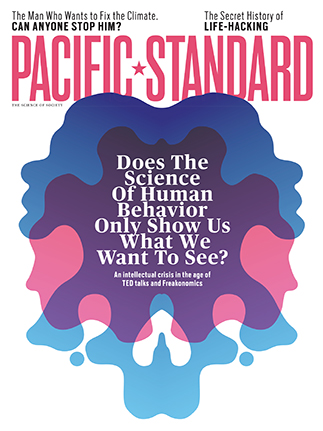SCIENCE OR JOURNALISM?
In his article “The Reformation,” Jerry Adler asks, “Can social scientists save themselves?” He has in view scientific uncertainty, technical errors, and non-replicability. He also is concerned with scientific fraud, dubious statistical practices, and plagiarism. The former, intrinsic to the practice of science, are subject to self-correcting scientific processes. The latter are not intrinsic to science but are self-inflicted and require policing through ethical codes. How well these self-correcting processes and self-policing codes work is hugely important, and Adler notes innovations under way. On this evidence, social scientists are busily, creatively saving themselves. But this is not Adler’s story line. He lumps more than he splinters. Listed together are “problems of fraud, statistical analysis, and replication.” These problems—jointly or individually is unclear—are, he suggests, “endemic” to all social science (even to the “entire field of biomedical science”). We learn that there is an “avalanche of error” and much “outright fakery.” In his article, self-correcting science is in the background; self-inflicted wounds—anecdotally and entertainingly presented—are in the foreground. Journalism and social science share an obligation to get the story right. I am confident that had Adler been guided by Evidence and Inference 101, his important story of self-inflicted wounds would have been situated within the success story of self-correcting and self-policing science.
Kenneth Prewitt
Carnegie Professor & Director, Scholarly Knowledge Project, Columbia University
ONE WORD
In response to Graeme Wood’s review of the linguist John McWhorter’s new book on the Sapir-Whorf theory (“A Dozen Words for Misunderstood,” May/June), Luis Uribe comments on Facebook: Of course language doesn’t dictate the reality you experience, but it does influence it. Here’s a simple example. The words cat and kat both look to me to be correct, and I have trouble with little, littel, liddle, and liddel. I thought I was just stupid and a bad speller until I was diagnosed with a type of aphasia. So now I have a word that goes with my condition and an understanding of the underlying process. Armed with that, I’ve developed techniques that allow me to write and function. Has the reality itself changed? No, but my perception of it has. If one word can do that, what could an entire language do?

LONG-DISTANCE LOVE
At her blog, Totalitarianism Today, Alina Stefanescue writes about “The Upside of Longing” (March/April): Nicole Allan wonders if the idealization engendered by long-distance intimacy ultimately amounts to a net cost or benefit…. It’s a fact that long-distance romance makes great fodder for fiction. Loving from far away gives us more control over the creation of our own narrative self—the person whom we wish to be when we line up our emotions, values, feelings, and hopes. Not to mention the time saved by only having to shave one’s legs once or twice a month.
OVER AT PSMAG.COM
In response to Paul Heibert’s PSmag.com article “Will We Ever See the End of Swearing?” the Parents Television Council writes: The use of certain words—especially some of the words referenced in Paul Heibert’s article—is intended to shock, to offend, or to be hurtful. Consider a female worker who endures a hostile work environment by being assaulted with the “b-word.” Such words are increasingly finding a home on prime-time broadcast television shows—the same shows that parents might believe are “safe” for their families to watch. That’s why the FCC is tasked with enforcing the broadcast indecency law. The broadcast networks use the publicly owned airwaves for free in exchange for serving the public interest, including their adherence to the law.
Tim Winter
President, Parents Television Council, Los Angeles
In response to Rebecca Buckwalter-Poza’s story “Treat, Don’t Tweet: The Dangerous Rise of Social Media in the Operating Room,” (at PSmag.com) Li Kane writes: I’m an OR nurse. My cell phone stays in my locker, turned off, unless I have a picture I want to show someone during a break. But I do see many of the other RNs on their cell phones during a case. This has been reported, and nothing gets done.
JOIN THE CONVERSATION
We want to hear from you. Talk to us:
This post originally appeared in the July/August 2014 print issue ofPacific Standardas “Social Networking.” Subscribe to our bimonthly magazine for more coverage of the science of society.





